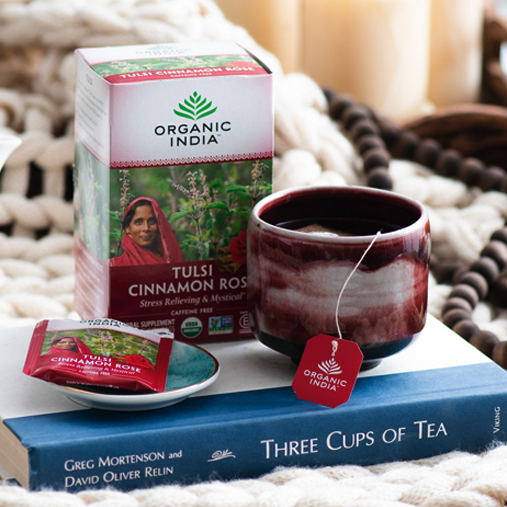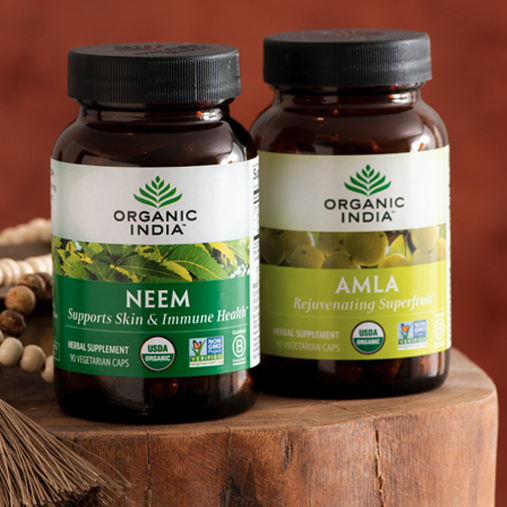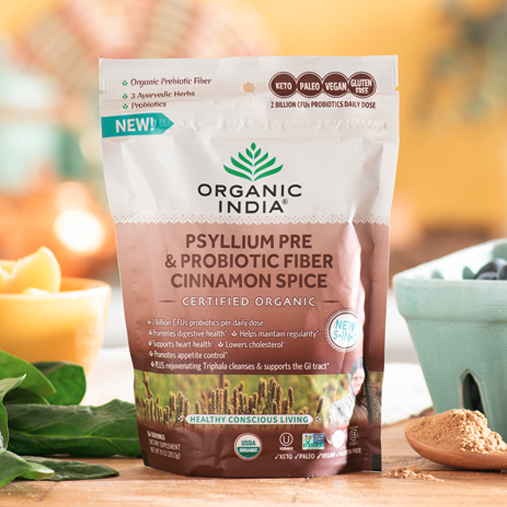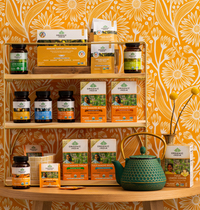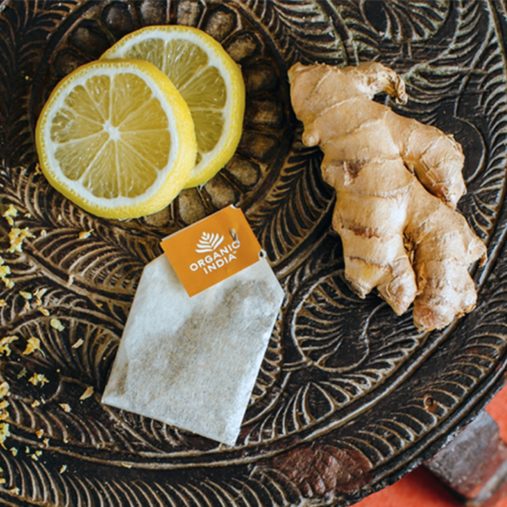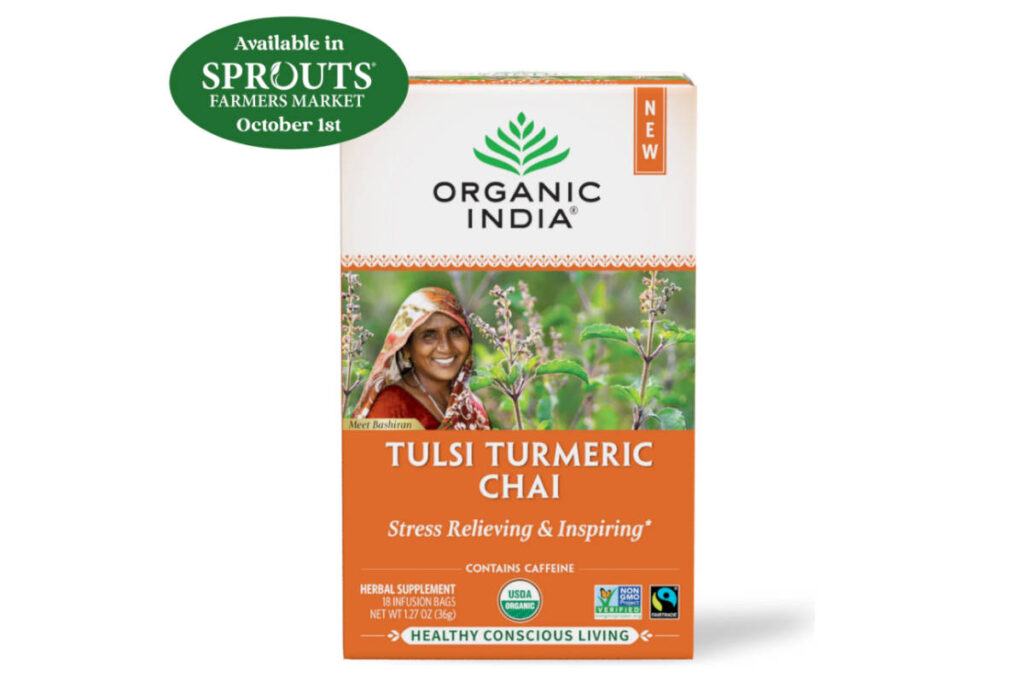Turmeric, also known as “Indian Saffron” and “The Golden Spice,” is one of Ayurveda’s best-known herbs.
A member of the ginger family, this bright orange rhizome has been used throughout India and Asia in cooking, skin care, as a dye, in traditional Ayurvedic herbalism, and in spiritual ceremonies.
These days, Turmeric and/or its active component, Curcumin, are commonly taken as supplements.
However, traditional Ayurvedic practitioners often recommended consuming Turmeric as a tea, either steeped or simmered in water or warm milk.
In this article, we explore the history and benefits of Turmeric tea, plus how to make the perfect cup to support your highest self.
What is Turmeric Tea?
Turmeric tea has been consumed for centuries across Asia and comes in many variations.
Its simplest form uses dried or fresh turmeric root steeped in water, often with other spices such as ginger, black pepper, or cardamom, and taken with a bit of lemon and honey.
Its flavor is earthy, mildly astringent, bright and clean.
The more well-known “Golden Milk” combines Turmeric with milk (cow milk, goat milk, coconut milk, etc.) and various complementary spices such as saffron, black pepper, cinnamon, cardamom, and nutmeg. A natural sweetener such as sugar or date sugar is typically added, and it is simmered for several minutes, then consumed warm.
The milk gives it a milder and sweeter flavor that complements the earthy and punchiness of the spices.
All forms of Turmeric tea create a beautiful golden beverage that nourishes body, mind, and spirit.
Many types of Turmeric tea are available, from premade herbal tea sachets or loose teas with complementary herbs like Tulsi to Golden Milk mixes you can transform into healthy lattes.
You can also make your own using fresh or dried Turmeric.
So, what are the benefits of drinking Turmeric tea? Research suggests a wide variety, so let’s dive in.
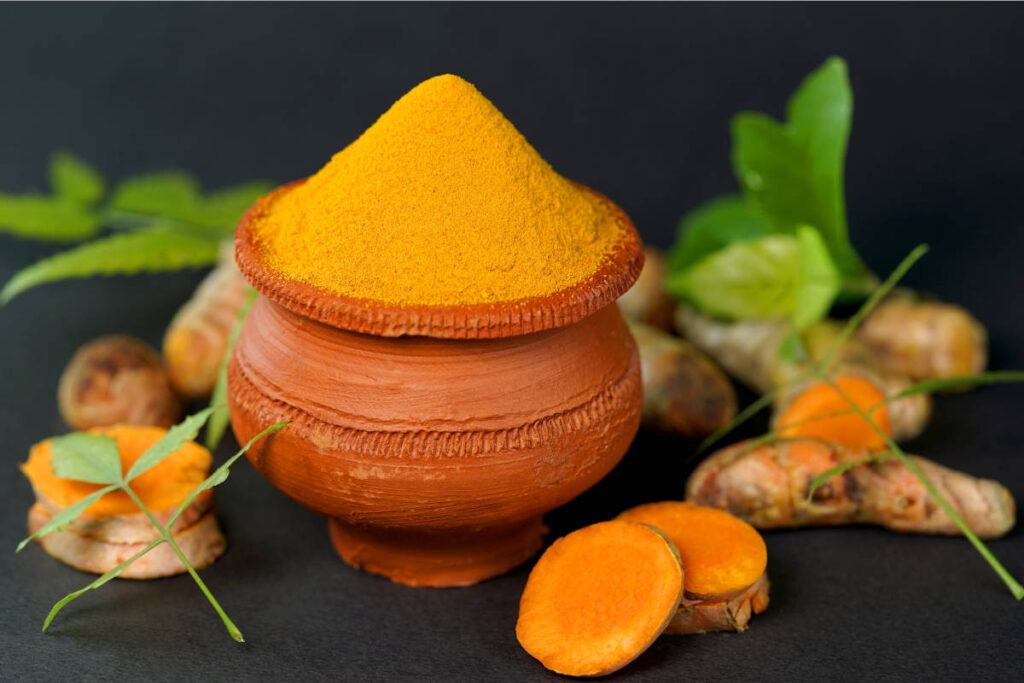
7 Magical Benefits of Turmeric Tea
Turmeric is one of the most-studied spices on the planet, with over 3,000 publications dedicated to uncovering its use in Ayurveda and other traditional systems of herbalism.
These studies focus on Turmeric and its primary active component, Curcumin.
Curcumin is one of over 100 curcuminoids found in Turmeric. It is a powerful antioxidant* and has been the subject of many studies.
Although concentrated forms of Curcumin are available as supplements, traditional Ayurvedic practitioners typically recommend taking whole Turmeric over Curcumin isolates.
The reason is that when you isolate a plant compound, you remove all the other natural and beneficial components of the plant.
Whole Turmeric contains many other active and inactive plant compounds besides Curcumin, such as vitamins, minerals, antioxidants, phenolics, and other components.
Turmeric tea is a beautiful way to access the benefits of the whole spice without swallowing a pill or eating Turmeric with every meal.
Now that you understand the benefits of consuming whole Turmeric, let’s look at some specific benefits of Turmeric and Turmeric tea.
1. Turmeric May Support Normal Inflammatory Response and Help with Minor Pain Management
One of Turmeric’s claims to fame is its antioxidant properties.
Antioxidants promote cell health by helping scavenge free radicals (unstable molecules), which can damage cells and promote inflammation over time.
As an antioxidant, Turmeric and Curcumin have been shown to be effective at supporting normal cell health inflammatory response and helping with minor pain management.
For this reason, many people enjoy drinking Turmeric tea to support healthy joints, promote mobility, and ease soreness or stiffness after exercise.
It’s also why you’ll often see Turmeric or Curcumin included in sports and fitness energy bars, protein powders, and supplements.
2. Turmeric Tea May Help Soothe Stress and Promote Relaxation
In Ayurveda, Turmeric is considered an adaptogenic herb. Meaning it helps the body adapt and thrive under various mental and emotional stressors.
Research has shown that the simple act of drinking tea can also positively impact our response to stress.
This may explain why Yogis and meditation masters swear by the benefits of drinking tea to enhance mindfulness and promote relaxation.
Hence, adopting a daily Turmeric tea ritual may be a wonderful way to soothe stress and promote a calm state of mind.
Organic India’s Tulsi Turmeric Ginger combines the adaptogenic power of Tulsi/Holy Basil (also known as “liquid yoga”) and Turmeric with warming Ginger, a perfect combination for promoting a contented state of mind.
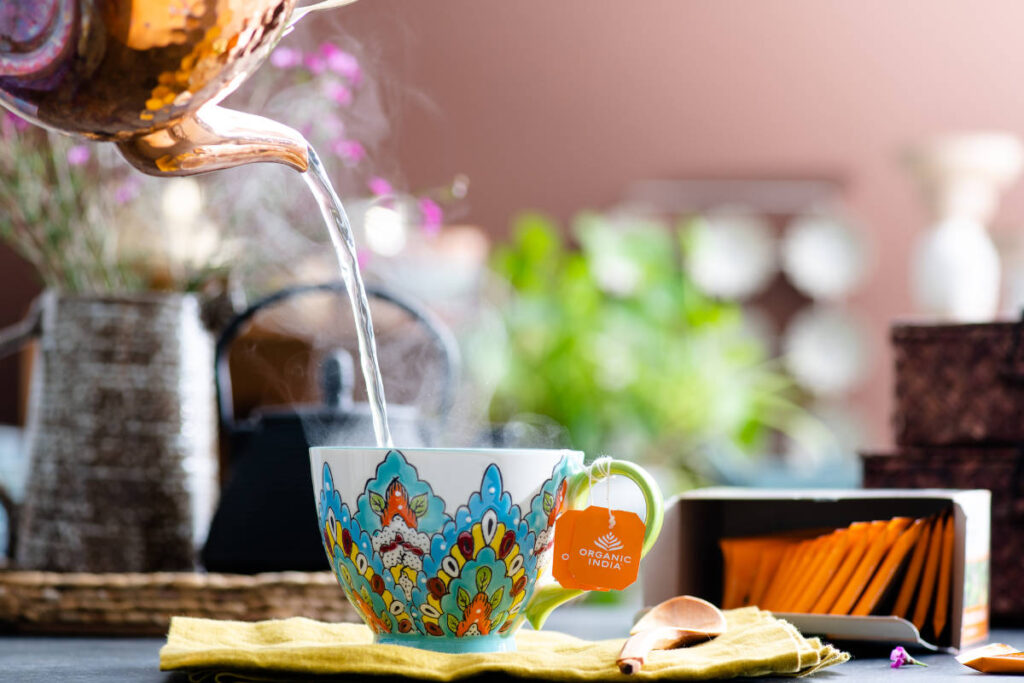
3. Turmeric May Support Circulation
A body of research suggests that Turmeric and Curcumin may support various aspects of heart and cardiovascular function.
For example, the antioxidants in Turmeric have been shown to support normal inflammatory response, which benefits the heart.
Turmeric and Curcumin have also been shown to support normal cholesterol levels
Add in what you just learned about the stress-busting benefits of Turmeric and drinking tea, and Turmeric Tea may be an excellent tonic for the heart.
4. Turmeric Tea May Ease Occasional Tummy Trouble
Many traditional wellness systems (and wise grandmothers worldwide) promote using herbal teas, such as Peppermint, Chamomile, or Ginger, to ease occasional tummy trouble.
In Ayurveda, Turmeric tea with honey is often recommended to help flush the digestive system and promote overall digestive health.*
There is some research to support this traditional use.
For example, Turmeric has been shown to promote gut microbiome diversity, support liver function (the liver plays a role in digestion via the release of bile), and may provide overall digestive support.
So, next time you overeat or experience minor gastrointestinal discomfort, try a cup of Turmeric tea to settle your stomach.
5. Turmeric Tea May Support Healthy, Glowing Skin
Turmeric has been used as an Ayurvedic beauty aid for thousands of years.
It’s also creating a sensation on social media as the primary ingredient in various homemade facial masks, scrubs, and anti-aging serums.
Studies suggest there is merit to using Turmeric topically and internally.
For example, Turmeric may:
- Help reduce or prevent photo-aging
- Promote healthy skin barrier function
- Reducing acne and balance oily skin
- Help with skin rashes
The bottom line: Turmeric tea may provide various benefits for the skin when taken internally and/or applied as a facial compress or steam.
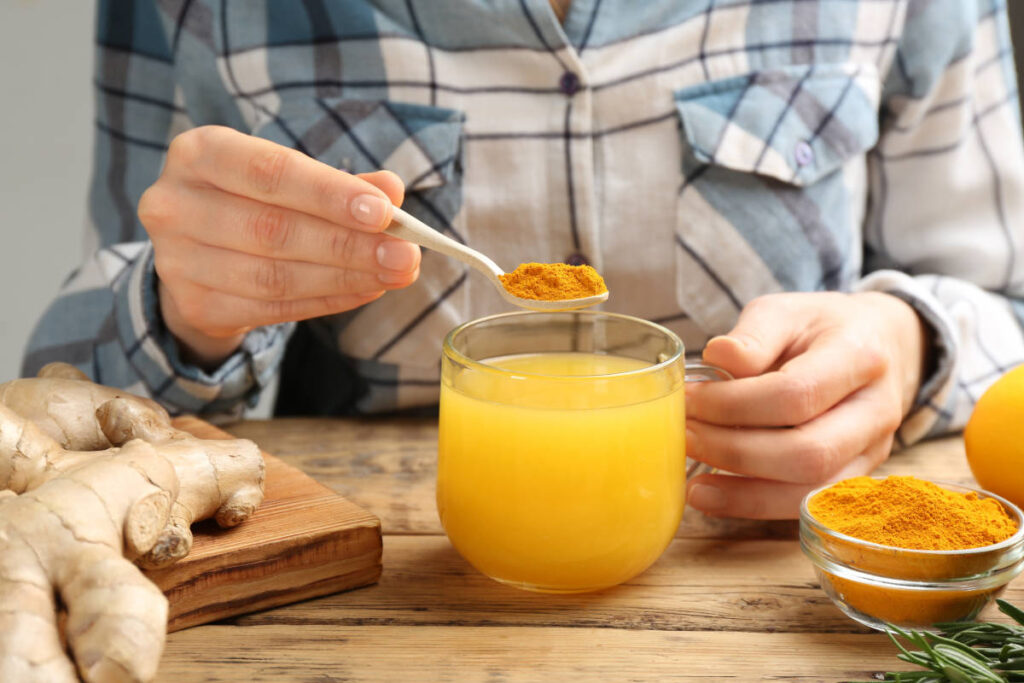
6. Turmeric May Support Normal Sugar Metabolism
The topic of blood sugar balance is hot in the integrative health space.
Advice on blood-sugar-balancing foods, exercises, and systems are readily given with the promise of a smaller waistline, more energy, and more efficient metabolism.
Yet, metabolism is complicated and involves many organs and systems, including the heart, liver, gut, pancreas, muscles, kidneys, and more.
For this reason, multi-functional herbs and spices, like Turmeric, are often recommended as part of a holistic metabolic approach.*
Research has begun to support the use of Turmeric/Curcumin for metabolic function, showing it may help support normal sugar metabolism.
Turmeric tea, such as Organic India’s Tulsi Turmeric Ginger, can be an excellent way to reap the metabolic benefits of Turmeric and Ginger, especially when taken before or after a meal to help support digestive fire.
7. Turmeric and Turmeric Tea May Support Normal Immune Function
In Western herbalism, plants like Echinacea and Garlic are go-to’s for immune support.
In Ayurveda, however, Turmeric and Turmeric teas, often paired with other immune-support herbs like Ginger or Tulsi, are often used as a first line of defense.
Research supports the use of Turmeric for various aspects of immune function. Studies show Turmeric may promote normal respiratory function and immune modulation (regulation), which includes the normal function of natural killer cells and cytokine response.
Turmeric is considered an expectorant in Ayurveda, meaning it supports clear airways by promoting normal mucous production and elimination.
For this reason, Turmeric tea may be inhaled as an herbal steam to help support respiratory function and/or enjoyed as a soothing tea for extra immune support.

3 Secrets To A Perfect Cup of Turmeric Tea
Various recipes and products are available for making Turmeric tea and Golden Milk.
However, the effectiveness of this traditional brew can be enhanced by following a few golden rules:
- Source the highest quality Turmeric you can find.
- Fresh Turmeric should be firm, moist, fragrant, and bright orange under the skin.
- Dried Turmeric should be bright orange in color and as fresh as possible (check the expiration or “packed on” date.
- Premixed teas, sachets, or Golden Milk mixes should smell fresh and earthy and produce a bright, golden tea.
- Source organic Turmeric to avoid pesticide and herbicide residues, preferably grown with regenerative agriculture standards that replenish the soil and yield larger, thicker and most efficacious roots.
- Always add Black Pepper to enhance absorption.
- The antioxidants, such as Curcumin, in Turmeric are plentiful, but their absorption rate is poor. Research has shown the addition of Black Pepper can enhance absorption by up to 2000%!
- Add a pinch of two of Black Pepper or to taste when making your own mix. It adds a nice zing in addition to its absorption benefits.
- When buying pre-made mixes, ensure they include Black Pepper, which may be listed as “Piperine.”
- Note: Proponents of Golden Milk vs. Turmeric Tea claim that the addition of fat from the milk further enhances the absorption of Turmeric’s active plant compounds. This is true. However, adding Black Pepper makes adding fat unnecessary (although there’s no harm in it either).
- The antioxidants, such as Curcumin, in Turmeric are plentiful, but their absorption rate is poor. Research has shown the addition of Black Pepper can enhance absorption by up to 2000%!
- Use Boiling Water
- Boiling water is essential to extract the maximum benefits from Turmeric and any additional herbs and spices.
- DIY recipes may recommend simmering the herbs for several minutes. Follow those instructions.
- For premade teas, such as Organic India’s Tulsi Turmeric Chai, steeping the tea bag in boiling water for 3-5 minutes is recommended for optimal infusion.
If you find Turmeric tea’s flavor too earthy, try adding a bit of lemon and/or natural sweeteners, such as raw honey, stevia, monkfruit, or coconut sugar.
These flavors will help balance Turmeric’s natural earthy and astringent flavor.
If, in contrast, you find your tea is too weak, increase the amount of Turmeric to your taste by adding an additional tea bag or extra dried or fresh Turmeric.
Complementary herbs and spices in Turmeric tea include:
- Cardamom
- Cinnamon
- Tulsi/Holy Basil
- Nutmeg
- Saffron
- Ginger
- Cloves
You can also add Turmeric to your favorite caffeinated tea, such as green or black tea, or try Organic India’s Tulsi Turmeric Chai, brand new and coming in October 2023 to Sprouts, for a caffeinated adaptogenic experience.
Finally, Turmeric’s intense color is fantastic for your body, but it can also stain anything with which it comes in contact, so take care when working with Turmeric in the kitchen.
Interested in Learning More About the Benefits of Herbal Teas?
At Organic India, we think tea is the elixir of life and would love to inspire you to create your own tea ritual.
For more tea tips, facts, and other fascinating information, check the following articles:
